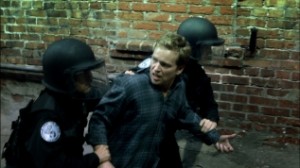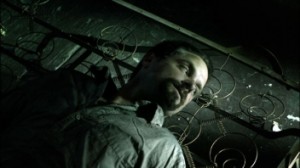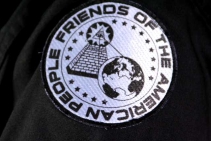 You could say that Philip K Dick is one of the main reasons why this blog even exists. Not only because he is my most beloved author, but also due to the fact that his thoughts about technology and social progress were so ahead of their time that the level of foreshadowing they present is just remarkable. Tonight I was granted the wonderful opportunity to see a ‘sneak preview’ screening of the most recent adaptation of a Philip K Dick novel, Radio Free Albemuth, at the Sci-Fi London film festival.
You could say that Philip K Dick is one of the main reasons why this blog even exists. Not only because he is my most beloved author, but also due to the fact that his thoughts about technology and social progress were so ahead of their time that the level of foreshadowing they present is just remarkable. Tonight I was granted the wonderful opportunity to see a ‘sneak preview’ screening of the most recent adaptation of a Philip K Dick novel, Radio Free Albemuth, at the Sci-Fi London film festival.
The original novel was never published during Dick’s life, its material refused by his publishers and eventually incorporated into the book VALIS which discusses many of the same concepts. The book was PKD’s attempt to make sense of some very strange and revelatory experiences that he had which began in 1974. The story explores many of his usual themes of totalitarian government and the effects on the everyday citizen, whilst transposing his musings and rationalising of the powerful visions and events that were occurring in his life at the time.
Details of the plot should be left for when you view or read the work, so rest assured that the rest of this review is completely spoiler free. But before I begin, let me first set the scene for the evening’s viewing – which just like one of Philip K Dick’s books was a miraculous juxtaposition of the normal with a sinister sense of oppression just behind the perfect facade. It all began as we were heading to the cinema to pick up our tickets for the later screening…
As we were walking our way down the busy streets of London, I could hear the usual sirens of police cars circling their way around the city – not an unusual sound by any means in a metropolis of this size. Crossing a small side street behind one such squad car, we walked passed a middle aged man with a large backpack on his back; standing against a street pollard as if resting and taking in his surroundings. At the cinema across the street stood a number of storm troopers and Empire soldiers (this was the Sci-Fi London festival after all), with tourists grouping in front of them to take their picture with such an iconic image of Darth Vader’s evil empire.
 Just as we begin to cross, walking in front of this man with his slick backed long hair and bulky backpack, an undercover police officer flashed a badge in his face and took him to one side. The police car we had just walked passed had stopped right in front of us and an officer jumped out.
Just as we begin to cross, walking in front of this man with his slick backed long hair and bulky backpack, an undercover police officer flashed a badge in his face and took him to one side. The police car we had just walked passed had stopped right in front of us and an officer jumped out.
My first thought was they were conducting a random stop-and-search, you see such things happening every now and then in London, and we continued across the street figuring that the man would have his bag searched and be let on his way. Which is when I heard more sirens approaching at a rapid pace.
We turned to see another police car pull up at speed in front of this loitering figure, the plain clothes police officer had at this point grabbed the man’s hands in an attempted arrest. The man let out a cry for help as uniformed police officers jumped out of the cars to grab his backpack, a number of them converging on him to ensure that he could be handcuffed despite his defiant shouts and struggles. We watched from across the street, presuming that he must have been a drug dealer or had committed some other crime that warranted such a quick and quite clearly targeted response by the state protection apparatus.
The whole event caused quite a scene right near one of London’s busiest tourist areas, everybody else had stopped in their tracks to watch this display of government control – and I’m sure that, just like I did, they all presumed that the man deserved to be arrested. In fact, our first thoughts as a group were: ‘we were standing next to that guy when he was approached by the police. He could have had a bomb in that bag, we’re lucky that he wasn’t a terrorist!‘.
I don’t want to digress too much with this scene, but I hope you will realise just how surreal it is to be picking up tickets for a movie about paranoia of totalitarian government and heavy handed state apparatus – storm troopers in full battle gear on one side of the street – and the real police arresting a man who was violently and very loudly protesting the event. We knew nothing of the circumstances leading up to this confrontation, but we presume that he must have done something to deserve it. That the state had protected us from some unforeseen and unknown danger. We presumed that we were being helped; saved. With that image in your mind, let me now discuss the latest adaptation of a Philip K Dick novel: Radio Free Albemuth.
 The showing itself was a test screening as such, complete with feedback forms for us to fill out at the end. We were told that our views on the film may impact the manner in which it is finally edited, and the chances of it finding wider distribution of one kind or another. Let me begin then by telling you what I wrote in the final section of the form: ‘Thank you for providing us with such a gift for the legacy of PKD!‘
The showing itself was a test screening as such, complete with feedback forms for us to fill out at the end. We were told that our views on the film may impact the manner in which it is finally edited, and the chances of it finding wider distribution of one kind or another. Let me begin then by telling you what I wrote in the final section of the form: ‘Thank you for providing us with such a gift for the legacy of PKD!‘
Being an independent film, there are the usual quirks that come with having such a low budget to play with. There are quite a few visionary sequences in the piece that come with the kinds of special effects you often see on a late night sci-fi channel special – reminiscent of mid-90s shows like Quantum Leap and other such efforts. There are also a few animated dream sequences, both in 2d and 3d, that show the lack of serious Hollywood money for the project. Added to all of this, some of the performances do play a little wooden at times; again, as you would expect from a film that cannot afford A-list actors to take part. But don’t think for one second that any of this impacts the film in any large way, far from it.
Because, in the end, it is these things – brought about by the very real restrictions of actually creating a feature length film with relatively little money – that are my only criticism; and they are minor criticisms at that. The script does an amazing job of transplanting about 90% of the original text almost perfectly. There were a few omissions (such as the ‘shoe-ad’ sequence) that I would be interested in hearing why they were removed. But otherwise, there were only one or two points (such as the aversion to alcohol, and some of the conflict between Nick and his wife later in the film) that I could not remember being in the original book but were likely added in order to help the narrative process for those who were not familiar with the work.
Beyond this, it is a perfect adaptation of Radio Free Albemuth. Absolutely spot on. When you consider that this book was also Philip K Dick’s attempt to deal with his own experiences in a semi-autobiographical manner this means something a great deal more than it would have were it an adaptation of another of his short stories of which Hollywood seems to love to delve into for ideas. This is the most accurate representation of Philip K Dick as a man that we have outside of his own words and appearances – it captures his soul perfectly, and faithfully recreates the inner turmoil that this true genius experienced towards the end of his life.
 For those of you who are not aware, and it’s not a spoiler to say it, Philip K Dick himself is a character in this story – the stone pillar that exists at the centre of the other character’s chaotic whirlwind of emotion and personal upheaval.
For those of you who are not aware, and it’s not a spoiler to say it, Philip K Dick himself is a character in this story – the stone pillar that exists at the centre of the other character’s chaotic whirlwind of emotion and personal upheaval.
It helps tremendously, then, that the role of Philip K Dick is by far the most convincing and magnetic performance on the screen, a truly wonderful piece of acting by Shea Whigham which completely exonerates him from his part in Fast & Furious recently (that’s the film snob in me coming out, I haven’t even seen it). He captures the tenderness that Philip K Dick was known to display with such authenticity that it is difficult to imagine it done in any other way. The other actors are at the very least perfectly capable and believable; with Hanna Hall, who plays sultry FAP (Friends of the American People: a Neighbourhood Watch version of the gestapo) agent Vivian Kaplan, another who wonderfully captures the essence of the role she was given.
The film is probably being most publicised because of the involvement of Alanis Morissette as Silvia Saddassa, and she has certainly been appropriately cast and brings soulfulness to the character – although she does give a slightly laboured performance at times. Her presence in the film, however, does provide an important sense of genuine musical talent which is required and thankfully provided. Those involved in the production of the film have also done a wonderful job when it comes to location scouting and providing the film with the right sense of slow-paced ominous build up that the book demands in order for the film to be an accurate adaptation.
Which is exactly what you get with Radio Free Albemuth – one of the most truthful and genuine on-screen depictions of the mind of Philip K Dick that has ever been, and, quite likely, ever will be produced. This film is for the fans, for the legacy of Philip K Dick, but at the same time will hopefully introduce a whole new audience to a genius mind that was well ahead of his time and is even still today under-appreciated.
You don’t get the masterful cinematography of Blade Runner. It doesn’t have the flawless characterisation of A Scanner Darkly. Instead, Radio Free Albemuth provides us with the most faithful film representation we have to date of just who Philip K Dick was as a man, a writer, a mystic.
Seeing the surreal muscle-flexing of a society edging ever closer to a police state right before my eyes only served to prove to me completely and utterly that Philip K Dick is a man that needs to be read – and Radio Free Albemuth is as perfect a gift towards helping ensure the immortality of his message and legacy as one could ever ask for. A legacy left for those who need it. For the kids.




